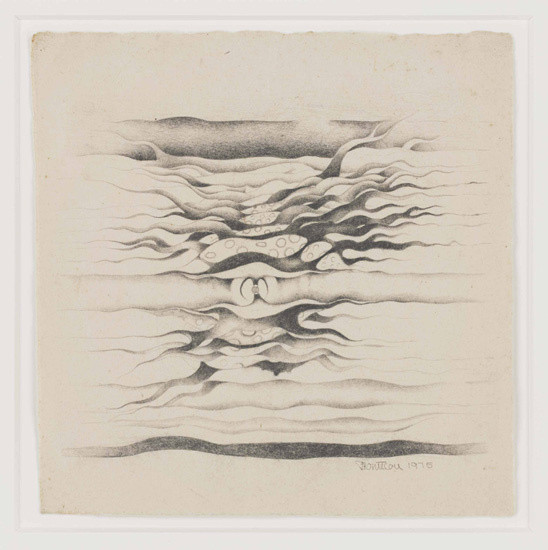Lee Bontecou
09 Jun - 27 Jul 2013
LEE BONTECOU
Works on Paper
9 June – 27 July 2013
Hauser & Wirth is proud to present a rare exhibition of drawings by the American artist Lee Bontecou, whose enigmatic practice defies attempts to categorise her work within the traditional doctrines of art history. ‘Lee Bontecou: Works on Paper’ brings together significant drawings by Bontecou, dating from her early career in the late sixties to more recent works, some never before exhibited publicly. This landmark exhibition at Hauser & Wirth’s Zurich gallery acts as a preview to the artist’s major drawing retrospective opening at The Menil Collection, Houston in spring 2014.
Born in Rhode Island in 1931, Bontecou is one of the few female artists to have gained international recognition during the 1960s. Her works are featured in the collections of numerous important museums and institutions. She was the subject of an acclaimed retrospective that opened at the Hammer Museum, Los Angeles CA and travelled to the Museum of Contemporary Art, Chicago IL and a major solo exhibition at Museum of Modern Art, New York NY.
Over the past five decades, Bontecou has used drawing to create intricate and immersive depictions of the wondrous and the sublime. These drawings are a treasure trove of polarities, which Bontecou marries together seamlessly. They are at once organic and mechanistic; futuristic and archaic; figurative and abstract; beautiful and menacing.
Bontecou has long been fascinated by both nature and science – interests that have played an important role as key motifs in her drawings. The earliest work in the exhibition, ‘Untitled’ (1969 – 2006), features a large flower with a thick stem and numerous petals radiating outwards. Beams of light shoot out from the petals as if the flower was illuminated, or even radioactive.
This ‘botanical surrealism’ continues in Bontecou’s later drawings, which combine organic forms with elements of the man-made environment and science fiction. In an untitled drawing from 1985, Bontecou depicts a field of flowers whose blooms have transformed into satellites, spinning airplane propellers and monstrous, alien-like figures. In another untitled drawing from 1994, Bontecou presents two windows, seemingly looking out onto a landscape that is at first glance recognisable. However upon closer inspection, the mutated forms take shape and the scene becomes nightmarish. Flowers emerge from lunar craters on a desert landscape, blossoms turn into biting mouths and petals become sharp spikes.
These works also highlight Bontecou’s unique experimentation with the materiality of her media, ranging from casein, printer’s ink, and soot from the artist’s welding torch to a combination of silver pencil, white charcoal and graphite, which, set against the deep black of the paper, gives her ghostly drawings an ethereal luminescence.
Bontecou’s recent drawings will also be on view at Hauser & Wirth Zürich. Using white and coloured pencil and pastels on paper, Bontecou crafts painterly landscapes, which the artist calls ‘worldscapes’, resembling ocean vistas, with the same mechanical precision seen in her early drawing.
Works on Paper
9 June – 27 July 2013
Hauser & Wirth is proud to present a rare exhibition of drawings by the American artist Lee Bontecou, whose enigmatic practice defies attempts to categorise her work within the traditional doctrines of art history. ‘Lee Bontecou: Works on Paper’ brings together significant drawings by Bontecou, dating from her early career in the late sixties to more recent works, some never before exhibited publicly. This landmark exhibition at Hauser & Wirth’s Zurich gallery acts as a preview to the artist’s major drawing retrospective opening at The Menil Collection, Houston in spring 2014.
Born in Rhode Island in 1931, Bontecou is one of the few female artists to have gained international recognition during the 1960s. Her works are featured in the collections of numerous important museums and institutions. She was the subject of an acclaimed retrospective that opened at the Hammer Museum, Los Angeles CA and travelled to the Museum of Contemporary Art, Chicago IL and a major solo exhibition at Museum of Modern Art, New York NY.
Over the past five decades, Bontecou has used drawing to create intricate and immersive depictions of the wondrous and the sublime. These drawings are a treasure trove of polarities, which Bontecou marries together seamlessly. They are at once organic and mechanistic; futuristic and archaic; figurative and abstract; beautiful and menacing.
Bontecou has long been fascinated by both nature and science – interests that have played an important role as key motifs in her drawings. The earliest work in the exhibition, ‘Untitled’ (1969 – 2006), features a large flower with a thick stem and numerous petals radiating outwards. Beams of light shoot out from the petals as if the flower was illuminated, or even radioactive.
This ‘botanical surrealism’ continues in Bontecou’s later drawings, which combine organic forms with elements of the man-made environment and science fiction. In an untitled drawing from 1985, Bontecou depicts a field of flowers whose blooms have transformed into satellites, spinning airplane propellers and monstrous, alien-like figures. In another untitled drawing from 1994, Bontecou presents two windows, seemingly looking out onto a landscape that is at first glance recognisable. However upon closer inspection, the mutated forms take shape and the scene becomes nightmarish. Flowers emerge from lunar craters on a desert landscape, blossoms turn into biting mouths and petals become sharp spikes.
These works also highlight Bontecou’s unique experimentation with the materiality of her media, ranging from casein, printer’s ink, and soot from the artist’s welding torch to a combination of silver pencil, white charcoal and graphite, which, set against the deep black of the paper, gives her ghostly drawings an ethereal luminescence.
Bontecou’s recent drawings will also be on view at Hauser & Wirth Zürich. Using white and coloured pencil and pastels on paper, Bontecou crafts painterly landscapes, which the artist calls ‘worldscapes’, resembling ocean vistas, with the same mechanical precision seen in her early drawing.

